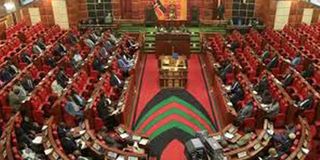Kenya MPs to recall House over fuel tax as shortage looms

What you need to know:
- The MPs, led by Alfred Keter (Nandi Hills), Caleb Amisi (Saboti), Tindi Mwale (Butere) and Godfrey Otsotsi (Nominated), yesterday called for an informal meeting of members, popularly known as Kamukunji, to discuss the increase in fuel prices even after Parliament last week voted to freeze the collection of the 16 per cent value added tax (VAT) on petroleum products until 2020.
Nairobi. MPs want National Assembly Speaker Justin Muturi to recall the House from recess to discuss the Treasury’s implementation of new tax on fuel, as a strike called by small petroleum suppliers signalled a possible shortage of the commodity.
The MPs, led by Alfred Keter (Nandi Hills), Caleb Amisi (Saboti), Tindi Mwale (Butere) and Godfrey Otsotsi (Nominated), yesterday called for an informal meeting of members, popularly known as Kamukunji, to discuss the increase in fuel prices even after Parliament last week voted to freeze the collection of the 16 per cent value added tax (VAT) on petroleum products until 2020.
The legislators want to discuss the conduct of Treasury Secretary Henry Rotich who on Friday directed the Kenya Revenue Authority (KRA) to implement the International Monetary Fund (IMF)-fronted tax in defiance of Parliament’s vote to delay the levy by two more years.
“Over 150 MPs have confirmed that they will attend the Kamukunji for us to address the public outcry on VAT that has led to so many problems. Wananchi have been forced to pay high fares, while goods, including food items, have become expensive,” said Mr Keter at a press conference at Parliament Buildings.
Pump prices rose 12 per cent to an average of Sh128.70 per litre of super petrol following the tax increase, of which the government will be collecting Sh55.16 per litre. The Kenya Independent Petroleum Dealers Association announced an indefinite strike yesterday, demanding the shelving of the tax.
The strike could affect supply of fuel in parts of the country, with the association claiming to control 55 per cent of the retail market.
Big oil marketers Shell, Total and KenolKobil control the other market segment. “This is in solidarity with all the other Kenyans against the government’s decision. The strike is indefinite until the decision is reversed,” the chairman of the Kenya Independent Petroleum Dealers Association, Joseph Karanja, told Reuters.
Some of the transporters parked their tankers outside the Nakuru fuel depot in observance of the strike.
The parliamentary amendment requires assent by President Uhuru Kenyatta, who is currently in China, to gain legal force. Minority Leader John Mbadi said Parliament’s clerk’s office indicated that the Finance Bill, 2018 would be sent to State House today or tomorrow for the President’s signature.
The Kenya National Chamber of Commerce & Industry chairman, Kiprono Kittony, said the fuel price increase would hit poor consumers hardest.
“The Kenya National Chamber of Commerce & Industry is concerned about how the VAT will impact the cost of everyday goods. This concern is raised from the experience of prices rising following an increase in the cost of petrol or diesel. The occurrence where a rise in the cost of petrol leads to the inflation of prices in other goods results from the impact of the rise in production and/or transportation costs amongst other factors. While businesses can claim the tax as input tax, the chamber is also concerned with the pace at which the Kenya Revenue Authority has in the past refunded VAT, with the delays ranging from months to years and the impact this has on businesses,” said Mr Kittony.
Crisis
The VAT law was enacted through the Finance Bill, 2013 but was delayed by three years. The MPs in 2016 changed the Finance Bill to delay the implementation of the law by two more years. Mr Keter said it is wrong to collect the fuel tax when petroleum products already attract excise levy.
“There is taxation already for petrol. There is Sh20 which has already attracted excise duty,” Mr Keter said.
The MP noted that the country is facing a corruption crisis, adding that going for those who have looted the economy would be the solution to sealing revenue loopholes.
Mr Amisi tabled a letter addressed to Mr Mbadi asking him to petition Mr Muturi to recall the House to discuss the petroleum prices crisis.
“I write requesting you to undertake through the office of the Speaker to recall the House pursuant to standing order 29(1) of the National Assembly following widespread outcry provoked by the Energy Regulatory Commission’s action in gazetting increased prices,” Mr Amisi said.
Belgut MP Nelson Koech has written a similar letter to the Leader of Majority, Aden Duale, demanding the recall of the House to deliberate on the rise in pump prices.
“Energy and for that matter fuel is the driving force of the economy and therefore with the exorbitant cost that it’s being retailed at, the ripple effect will be the rise of the cost of production and manufacturing, high electricity charges, upwards spiralling of the cost of transport and related industries and ultimately, skyrocketed prices of basic commodities,” Mr Amisi said.
He said the government borrowing has to be scrutinised and that the House enjoys delegated sovereignty from the people of Kenya who need to know how Treasury is servicing the loans.
“We need to know the rates, conditions and the collateral that was used to guarantee the loans,” Mr Amisi said.
Mr Otsotsi said there is an attempt to fight the independence of Parliament.
“For CS Rotich to disobey a decision of the House is the highest level of impunity that we are witnessing from the government side,” Mr Otsotsi said.
Mr Mwale accused the Treasury of taxing the poor to raise money to pay back debt after entering questionable loan agreements.
“The government should tax the rich and cushion the poor. The prices of all commodities have gone up because of the increase in fuel prices,” Mr Mwale said.




